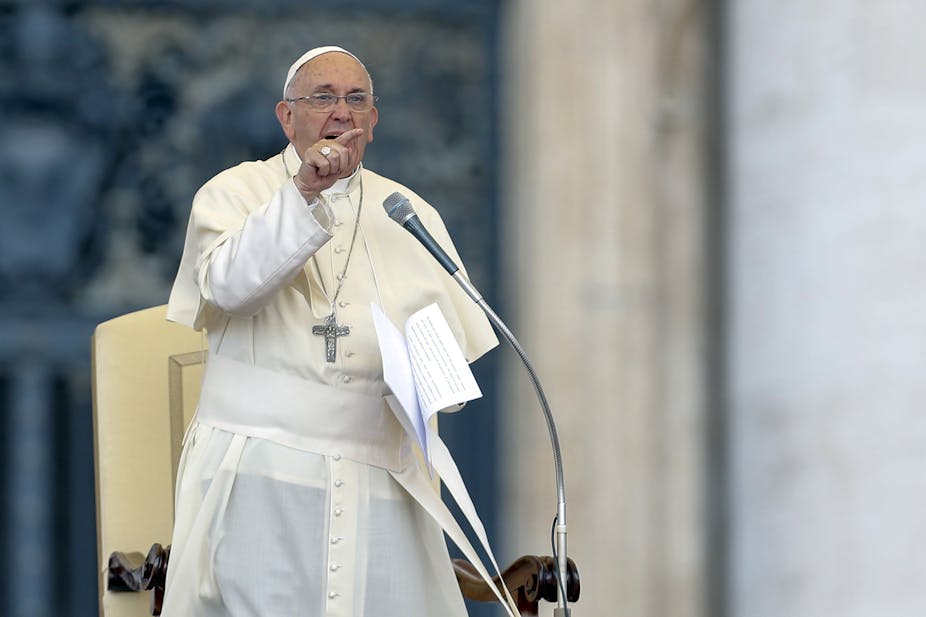Warning of “unprecedented destruction of the ecosystem,” Pope Francis in an encyclical to be released this week (and already leaked) calls for aggressive action to combat climate change and other environmental problems.
In the special papal letter addressed to the world community, Pope Francis is expected to emphasize the deep moral imperative for rich countries to move away from reliance on fossil fuels, committing to cleaner energy sources and reduced consumption.
Voicing skepticism of market-based strategies like carbon credits, he called on rich nations to directly aid poorer countries in their pursuit of sustainable economic growth and efforts to protect against climate change risks.
In the United States, where debate over climate change remains sharply divided along partisan lines, the release of the encyclical comes at a time of changing cultural dynamics on the issue. In this context, Pope Francis’ appeals may contribute to an important shift in public debate.
Shifting the conversation
Though US Catholic bishops are reportedly divided over Pope Francis’ encyclical, his letter marks the launch of coordinated sermons, homilies, and media outreach on the part of several US bishops and aligned Catholic groups.
The Vatican-led campaign sets the stage for a September visit to the US by Pope Francis in which he will give separate addresses to the United Nations General Assembly and to a joint session of the US Congress, all in the lead up to the United Nations Climate Summit a few months later in Paris.
Surveys suggest that US Catholics, who number almost 80 million and comprise about a quarter of voters, are more likely than other Christians to believe that climate change is happening, that it is human caused, and to support policy action.
But instead of strongly held opinions, these beliefs are mostly weak sentiments, according a survey done earlier this year by the Yale University Project on Climate Change Communication. Rather than identify the issue as one that involves considerations of right and wrong, most Catholics like other Americans still think about climate change abstractly and in technical terms.
Yet the Vatican-led campaign on climate change has the potential to reframe the issue as a religious and moral imperative, helping parishioners articulate why climate change matters, deepening their commitment to action.
Pope Francis is viewed favorably by 90 percent of US Catholics and by 70 percent of all Americans. Given his popularity, the September visit is likely to command the type of saturation media coverage more typical of a Royal wedding or Super Bowl.
Such coverage will help elevate discussion of the moral significance of climate change. Many Catholic churches are also likely to be transformed into engines of civic engagement, as clergy and aligned groups exhort churchgoers to get involved, to reach out to others in their communities, and to contact elected officials.
A changing political context
The Vatican’s campaign coincides with the start of the Republican Party’s nomination race for president, posing a serious challenge to conservatives who continue to deny the warnings of climate scientists or who oppose efforts to limit greenhouse gas emissions.
Among declared or likely Republican candidates, Jeb Bush, Chris Christie, Marco Rubio, George Pataki, Rick Santorum, and Bobby Jindal all identify as faithful Catholics. The Pope’s outspoken advocacy on the issue is likely to trigger uncomfortable questions that will dog Republican candidates on the campaign trail and in debates.
His address to a joint session of Congress will generate similar tensions for the more than 80 Republican members who are Catholic, including Speaker of the House John Boehner and former vice presidential candidate Paul Ryan.
Jay Faison, a conservative Republican and entrepreneur, recently announced he was donating $165 million to endow a climate change and clean energy foundation. For members of his party, as Faison told The Washington Post, the significance of the Vatican’s campaign is clear: “There’s a good argument to be made that losing Catholics will lose you the election.”
It’s impossible to predict precisely the impact of Pope Francis’ moral call to action on climate change, making it an exaggeration to say that his encyclical is a political game changer. But the Vatican-led campaign is a significant sign that the conversation about climate change may be shifting.
As Vatican adviser and Columbia University economist Jeffrey Sachs argues, it’s also important to stay focused on the major technical hurdles to decarbonizing the world economy.
Such a transformation will require not just moral commitment and more mindful consumption, but most importantly major government financing of innovations in solar, wind, nuclear energy, and carbon capture and storage technologies.

